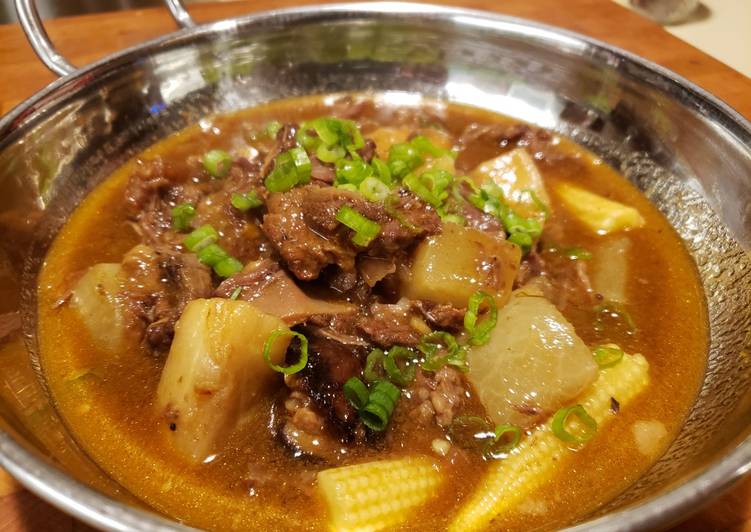Pressure Cooker Chinese Beef Rib and Tendon Stew. While the tendon is cooking, prepare the other ingredients. Lay the short ribs out on a baking sheet and season with salt and pepper. Before you jump to Pressure Cooker Chinese Beef Rib and Tendon Stew recipe, you may want to read this short interesting healthy tips about The Simple Ways to Be Healthy.
 While the tendon is cooking, prepare the other ingredients.
Lay the short ribs out on a baking sheet and season with salt and pepper.
So if you can't find it, simply omit it.
You can have Pressure Cooker Chinese Beef Rib and Tendon Stew using 22 ingredients and 18 steps. Here is how you achieve that.
While the tendon is cooking, prepare the other ingredients.
Lay the short ribs out on a baking sheet and season with salt and pepper.
So if you can't find it, simply omit it.
You can have Pressure Cooker Chinese Beef Rib and Tendon Stew using 22 ingredients and 18 steps. Here is how you achieve that.
Ingredients of Pressure Cooker Chinese Beef Rib and Tendon Stew
- Prepare 2-3 lbs of beef short ribs.
- Prepare 1 lb of beef tendon.
- Prepare 1 Tbsp of oil.
- You need 3 of shallots, sliced.
- You need 4 cloves of garlic, minced.
- You need 5 of spring onions.
- You need 4 inch of ginger, peeled & sliced.
- You need 1 Tbsp of shaoxing wine.
- Prepare 2 cups of chicken stock.
- It's 3 Tbsp of chu hou paste.
- You need 1 Tbsp of soy sauce.
- You need 1 Tbsp of dark soy sauce.
- You need 2 tsp of oyster sauce.
- It's 2 tsp of sugar.
- You need 3 of whole star anise.
- It's 5 inches of orange peel.
- Prepare 1.5 lbs of daikon, peeled and cubed.
- It's 3 of parsnips, peeled and cubed.
- Prepare 5 oz of shitake, sliced.
- It's 1 can of baby corn.
- It's 4 Tbsp of water.
- You need 4 Tbsp of corn starch.
Easiest Way to Make Award-winning Pressure Cooker Chinese Beef Rib and Tendon Stew. Every person knows that in order to truly be healthy you need to eat a naturally healthy and balanced diet and get a proper workout regularly. Cut the brisket and tendon into small cubes. Add cooking oil in InstantPot and press Saute Mode.
Pressure Cooker Chinese Beef Rib and Tendon Stew instructions
- Place the beef tendon in the pressure cooker and add 1 cup water. Pressure cook on high pressure for 1 hour and 15 min and natural pressure release..
- While the tendon is cooking, prepare the other ingredients..
- Lay the short ribs out on a baking sheet and season with salt and pepper..
- Separate the green from the white parts of the spring onion. Add the white parts to a small bowl and then prep the garlic, shallot and ginger into the bowl..
- Peel and cube the daikon and parsnips, and rough slice the shitake and add to a large bowl..
- In a small dish add the chu hou paste, soy sauces, oyster sauce, sugar, star anise and orange peel..
- When the tendon is done cooking, pour the cooking liquid out, and rinse the tendon under cool water. Cut the tendon into bite size pieces..
- Preheat the oven broiler to high. Broil the short ribs for 5 minutes until they are seared and browning..
- In the cleaned out pressure cooker heat the oil with the saute function. Add the onions, shallot, garlic and ginger. Cook until they begin to brown and stick to the bottom of the pan and then add the shaoxing wine..
- After the shaoxing has deglaze the bottom of the pan, add the stock and the chu hou mixture. Stir to distribute..
- Layer in the short ribs and cubed tendon. Add the daikon, parsnip and mushroom on top..
- Pressure cook on high pressure for 10 min.
- Quick release the pressure. Drian the baby corn and add it to a bowl..
- Remove the daikon and parsnips and place on top of the baby corn. Leave this aside to stay warm..
- Replace the lid on the pressure cooker and cook on high pressure for another 20 min.
- Let the pressure naturally release. Remove the lid and pick out the rib bones..
- Combine the starch and water into a slurry. Bring the stew to a simmer and add the slurry while stirring a little at a time until it thickens to your level of choosing..
- Add the reserved vegetables and mix. Dice the green stems of the onions for garnish..
Add daikon and bring to a boil again. See recipes for Pressure Cooker Chinese Beef Rib and Tendon Stew too. Place beef tendon in a pressure cooker and add water to cover beef completely. Place on high heat until rated pressure has been reached. Beef tendon is a popular ingredient in Asian cuisine.